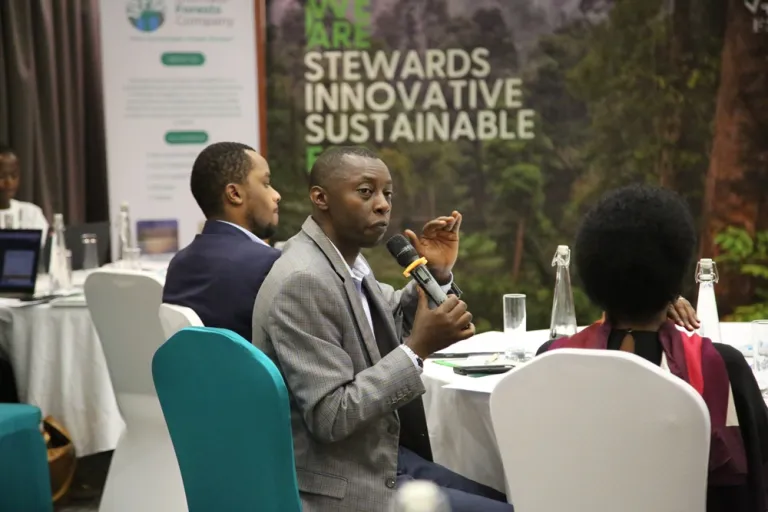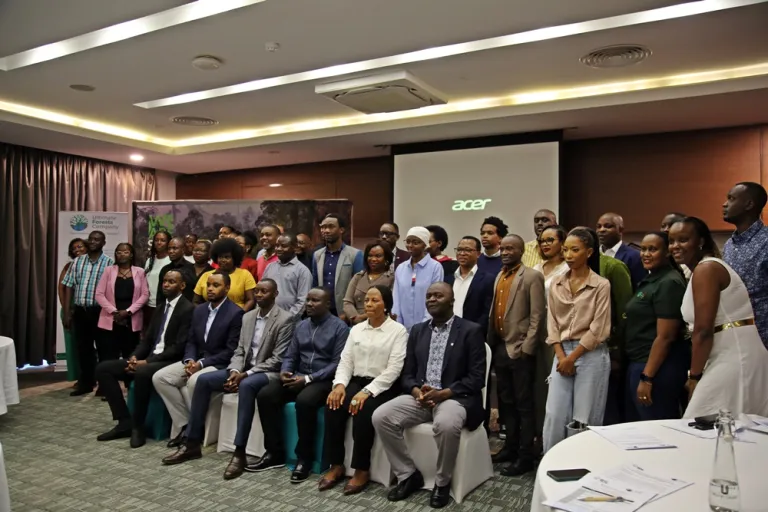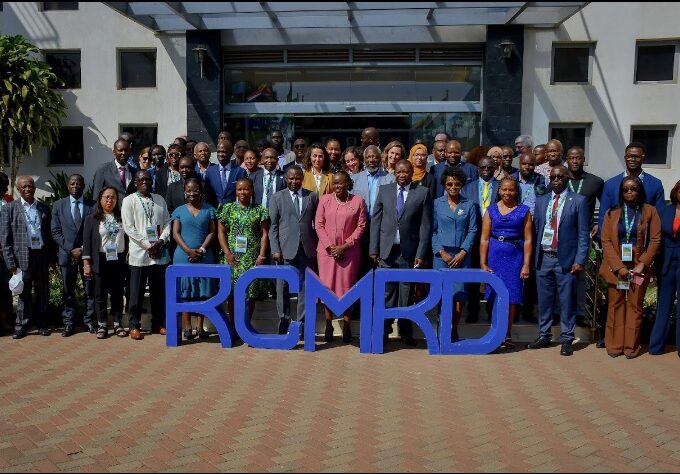Climate Change: Why should Rwanda certify its forests

In today’s world, given the challenges posed by climate change and environmental degradation, it is crucial to ensure our natural resources are used wisely, protected and preserved for future generations.
Certifying Rwanda’s forests would do so, and would also ensure forests are managed sustainably, balancing environmental health, social equity, and economic viability.
Any forest should be certified
Although it’s not mandatory to certify a forest, it has many benefits. Therefore, stakeholders, including consumers, businesses, and policymakers, must understand the significance of certified products. Campaigns that highlight the importance of choosing certified wood can lead to increased demand, encouraging more forest owners to seek certification.
Certifying a forest doesn’t only concern large forests or companies. Anyone can certify his forest and any forest can be certified as clarified Severinus Jembe, Certification Manager-Africa in Soil Association Certification based in UK.
Though the costs for the study of the FSC requirements could be a bit high for single small forests holdings, Mr Severinus advise them to form a group. They can form a group, hire someone amongst themselves or someone independent to be the group manager to help them coordinate everything in order to meet the FSC requirements.
What is Forest Certification?
FAO defines it as a voluntary process whereby an independent third party (the certifier) assesses the quality of forest management and production against a set of requirements (standards) predetermined by a public or a private certification organization.

What is FSC Certification?
FSC Certification (Forest Stewardship Council Certification) confirms that forests are being managed in a way that preserves biological diversity and benefits the lives of local people and workers, while ensuring they sustain economic viability.
The FSC system monitors how forests are managed. It puts in place mechanisms to label and trace timber and other products all the way to the consumer. It does this through two kinds of certification: Forest Management Certification and Chain of Custody Certification.
Why Rwanda?
Rwanda’s forests cover approximately 704,997 ha equivalent to 29.8 per cent of its total land area. Government of Rwanda considers the forestry sector, one of its key pillars for sustainable development and climate resilience in line with its National Forestry Policy.
Rwanda’s forests support agriculture which accounts for 36 per cent of the country’s gross domestic product (GDP). Forests are a strong foundation for Rwanda’s tourism sector. They protect rare and endangered wildlife, particularly, the mountain gorillas that are major tourists’ attraction.
Forests provide approximately 98.5 per cent of Rwanda’s primary energy requirements in the form of firewood (83.3 per cent) and charcoal (15.2 per cent).
A 2019 GIZ market analysis report indicates that Rwanda’s timber industry generates approximately USD 76 million annually and supports more than 75,000 people with direct and indirect jobs.

Some reasons why Rwanda should certify its forests
By implementing FSC Certification, Government of Rwanda would meet the United Nations Sustainable Development Goals (SDGs), which FSC supported to formulate. FSC contributes to 14 of the 17 goals and 40 targets.
Government of Rwanda would also attain its commitment to restore 2 million hectares of degraded land it pledged under the African Forest Landscape Restoration Initiative (AFR 100).
It would also satisfy social, environmental and economic needs to name few. In general, certifying the country’s forests:
Contribute to the Environmental Protection: Certified forests contribute to the preservation of ecosystems.Climate Change Mitigation: Forests play a crucial role in carbon sequestration, absorbing carbon dioxide from the atmosphere. Sustainable forest management practices help maintain healthy forests that can better mitigate the effects of climate change.
Supporting Local Communities: Forest certification often involves the participation of local communities, ensuring that their rights and needs are respected. This not only fosters economic development through sustainable forestry practices but also encourages community involvement in conservation efforts.Market Demand: As consumers become increasingly aware of environmental issues, there is a growing demand for responsibly sourced wood and products. Forest certification provides a way for businesses to demonstrate their commitment to sustainability, gaining trust and loyalty from environmentally-conscious consumers.
Regulatory Compliance: Many countries have regulations concerning forest use and sustainability. Certification can help forest managers comply with these regulations, reducing the risk of legal issues and promoting best practices in forest management.

The 10 FSC’s principles that are crucial for forest management and certification:
- Respect for laws
- Workers’ rights and conditions of employment
- Rights of indigenous peoples
- Community Relations
- Benefits of the forest
- Environmental value and impact
- Management planning
- Monitoring and evaluation
- High conservation values
- Implementation of management activities
Trending Now
Hot Topics
Related Articles
Leaders Call for Stronger Monitoring to Turn Ecosystem Restoration Commitments into Results
Nairobi, Kenya — 27 January 2026 Country and regional leaders, alongside technical...
Worm Tea: A Natural Path to Farming Without Harmful Chemicals
For much of his early farming life, Isaac Mubashankwaya believed chemical fertilizers...
Enroll Now Before 31 December 2025: International German Language Exams Launch in Rwanda
Rwanda will host the European Consortium for the Certificate of Attainment in...
Rwanda Validates Environment and Climate Change Mainstreaming Strategy 2024–2029
This Tuesday, 23 December 2025, the Rwanda Environment Management Authority (REMA), in...














Leave a comment